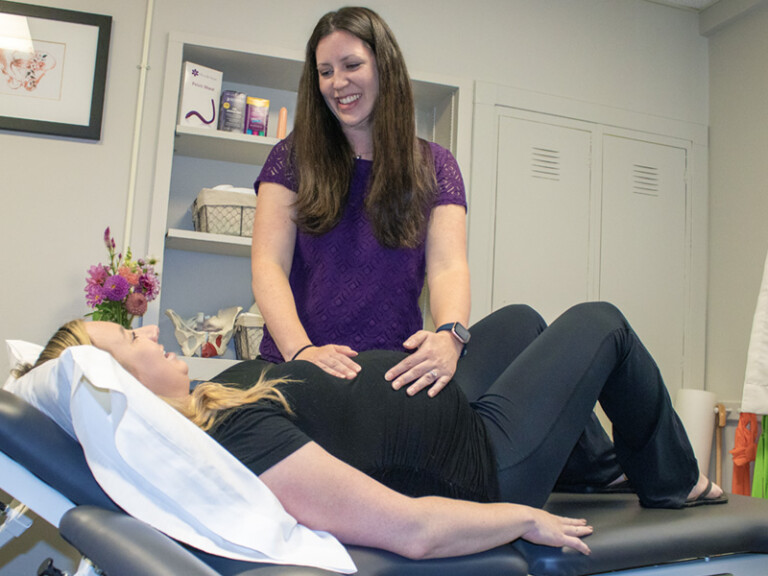The United States Preventative Services Task Force (USPSTF), an independent volunteer panel of experts in medicine, states that 1 in 8 women will get breast cancer in her lifetime, making it the second most common cancer in women (after skin cancer). News headlines earlier this year announced that screening recommendations for breast cancer would be lowered from 50 to 40 years of age. The science that has led to these recent draft recommendations will save lives as research continues to advance measures to improve breast health, especially among groups affected by racial and ethnic disparities.
A summary of the recently updated recommendations are as follows:
- The age at which an initial screening mammogram (MMG) is needed has changed from 50 to 40 years.
- The USPSTF recommends biennial screening mammography for women ages 40 to 74 years.
- For women ages 75 years and older, the decision to continue or discontinue screening mammography should be determined by the woman’s health status with the consultation of a physician.
The full recommendation in progress, which lists supporting evidence as well as areas in which more research is still needed, is available on the USPSTF website.
Recommendations from Breast Oncologist at MMC
Meadville Medical Center asked Dr. Gurleen Pasricha, MD, Director of Breast Oncology Services at the Yolanda G. Barco Oncology Institute, for clarification and better understanding about the changes and the reasoning behind them. “I am glad that the task force recognized the need for change, but this is something that all cancer organizations (ASBS, NCCN, ASCO, ACR) have recommended for many years,” said Dr. Pasricha. “As a breast oncologist, my recommendations have been more in line with that of the cancer organizations. I am looking forward to final USPTF recommendations, but I am excited that draft recommendations are projected to save 19% more lives.”
Risk Assessment
Earlier screenings alone are not enough to ensure early detection of breast cancer. Specifically, Dr. Pasricha wants women to become more familiar with risk assessments and more knowledgeable about breast awareness, which goes beyond the monthly self-exam that women have long been encouraged to practice. Starting at age 25, women should have a discussion with their primary care physician about their family history of malignancies and determine where they fit within a formal risk assessment. A breast cancer risk assessment, known as a TC score, can be completed through the Tyrer-Cuzick Risk Assessment Calculator, for those curious about where their risk stands until they can consult with a physician.
Factors determined with the help of a medical professional would include the status of any pathogenic mutations (BRCA or PALB2, for example) and breast density (the amount of breast tissue): “it is important to recognize that dense breasts can hide cancers, which are hard to find if only using only MMG”, says Dr. Pasricha. The risk assessment will help determine if a woman needs additional preventative measures in accordance with the newly recommended guidelines, perhaps even sooner than at age 40:
| Level of Breast Cancer Risk OR History | Additional Factors | Recommendations |
|---|---|---|
| Average Risk | Breast density considered non-dense | Annual mammography starting at age 40 |
| Increased breast density | Annual mammography starting at age 40 and supplemental imaging | |
| Higher-than-average Risk | Detected presence of pathogenic mutation OR prior radiation therapy of chest wall between ages 10-30 | Annual MRI starting at 25 years of age followed by annual mammography starting at 30 years of age |
| A strong family history of breast cancer predicting lifetime risk is 20% or more | Annual mammography and supplemental imaging starting at 35 years of age as recommended by physician | |
| Prior History of Breast Cancer | Age 50 or less OR with dense breasts | Annual mammography and supplemental imaging as recommended by physician |
| Age 50 or more AND with non-dense breasts | Annual mammography |
View the original Position Statement on Screening Mammography
Breast Awareness
Beyond routine screenings and risk assessments, women are encouraged to develop better breast awareness by familiarizing themselves with what looks and feels “normal” and healthy with their own bodies. Breast awareness includes a detailed inspection, along with feeling for abnormalities, best done monthly to be able to notice any changes. To do this effectively, Dr. Pasricha suggests:
Look in the mirror and assess for breast size and shape, skin changes like redness, thickening or dimpling. Carefully look at the nipple and areola and asses for change in size, shape and color, and specifically nipple retraction or inversion. Pay close attention to any nipple discharge, especially bloody discharge. Feel for any lumps in the breasts, best done in clockwise circular motion and complete the breast exam by feeling for any lumps in the armpits.
Breast Services and Diagnostics at MMC
Meadville Medical Center offers mammography services at the Vernon Women’s Center at One Vernon Place. According to Terry Beck, manager of radiology services at MMC: “Meadville Medical Center is certified as a ‘Breast Imaging Center of Excellence’ by the American College of Radiology’s Commission on Quality and Safety and the Commission on Breast Imaging. An accreditation search in August 2023 revealed that MMC’s One Vernon Place was one of about only 137 BICOE facilities within the state of Pennsylvania.
Many of those standards include accreditation in various diagnostic services. Dr. Benjamin Harris, a radiologist for MMC who is fellowship trained in breast imaging, says advanced diagnostic services offered at the Center, such as breast ultrasound, breast MRI, and advanced tissue-sampling techniques, enable the facility to conduct onsite biopsies. These biopsies may also be guided by ultrasound or MRI, but also include stereotactic methods, in which the tissue is extracted (although less invasively than, for example, a surgical biopsy) and then sent to pathology.
MMC’s radiologists utilize 3D tomosynthesis mammography at Vernon Women’s Center for improved accuracy and breast cancer detection. When the Center first opened, it was recommended that patients consider the 3D mammography services now available to them versus the traditional, two-dimensional mammograms, which were also known to create a level of discomfort because of multiple compressions of the breasts at various angles. Digital mammography requires far fewer compressions to produce an accurate image of the breasts. Today, according to Dr. Harris, “tomosynthesis has really become the standard for most hospitals, and only in rare circumstances might a traditional x-ray mammogram really be needed or requested.”
While technological advances have made 3D mammograms more accurate and more common, it is important to note that they are not available at all medical facilities. They are available through Meadville Medical Center at Vernon Women’s Center as an essential component in detecting and treating breast cancer: “our certified mammography technologists have a combined total of more than 50 years of experience taking care of patients in a compassionate environment for Meadville Medical Center”, says Kylee Hauser, lead mammography technologist. “It is our mission to help save women’s lives from breast cancer, and we work closely as a team alongside board-certified radiologists, nurse navigators, and oncologists to ensure our patients receive comprehensive care within our health system.”
Survivors and “Thrivers”
Breast cancer survival rates continue to increase, in part due to improvements in treatments that benefit from studies and clinical trials like the ones that take place at the Yolanda G. Barco Oncology Institute: “[nationwide] the five-year survival rate for breast cancer diagnoses is currently around 90.6 percent”, says Dr. Pasricha. Research will continue to improve recommendations, with the particular hope that that the racial and ethnic disparities in breast health will be addressed, as African American and Hispanic women experience disproportionately high breast cancer diagnoses and mortality rates. For example, it has been noted that black women are 40% more likely to die from breast cancer than white women.
Preventative and rehabilitative treatments for patients, who are susceptible to or are experiencing the side effects of cancer treatment, have gained much success in recent years as well. Breast cancer-related lymphedema affects approximately 1 in 5 patients, according to the National Comprehensive Cancer Network (NCCN). To detect, diagnose, and manage lymphedema in breast cancer patients, the NCCN provides guidelines that are used extensively by Meadville Medical Center’s lymphedema prospective surveillance program: “enrollment in the survivorship surveillance program has more than doubled in the past year”, says Rachel Yochim, MSOT, OTR/L, CLT, an occupational therapist and certified lymphedema therapist with MMC’s women’s health therapies. “I’m part of the pre-operative appointments, establishing preventative care, early identification and treatment of issues that may arise during their journey, such as lymphedema, range of motion restrictions, weakness, fatigue, and deconditioning. Ultimately, the goal of the program is to provide supportive and rehabilitative care so that the patient can return to their prior level of comfort.”
Award-winning Oncology Care
The latest recommendations in breast cancer screenings come at a time when Dr. Pasricha is experiencing the results of efforts in clinical trials and programs implemented at the Yolanda G. Barco Institute. For this work in helping breast cancer patients, she was recognized by the Pennsylvania Medical Society as one of the state’s top physicians under 40 for 2023.
Dr. Gurleen Pasricha earned her medical degree from Sri Devaraj Urs Medical College in India, then completed her internal medicine residency at Allegheny General Hospital in Pittsburgh, where she also completed her fellowship in hematology and oncology. She serves as the director of breast oncology at the Yolanda G. Barco Oncology Institute for Meadville Medical Center. As for what to expect with her work in the coming months?
We are in a very exciting phase of expansion of breast cancer services this year. Our community has embraced a “fast track breast program” in which patients are seen by a medical oncologist within one week of their biopsy. This is paired with the “breast navigator program”, which is led by trained oncology nurses who help to decrease anxiety and stress on the person, and the family of that person, who has just received a life-changing diagnosis.
People with breast cancer-related concerns, such as genetics or family history, dense breasts, or atypical biopsy, who do not yet have a diagnosis of cancer, can still be seen in a high-risk breast clinic. We champion care to prevent cancer from occurring. Our breast tumor board now meets every 2 weeks to discuss our new patients in a multidisciplinary discussion with breast surgeons, radiologists, and radiation oncologists. We are strengthening our survivorship program and lowering lymphedema and other comorbidities (the simultaneous presence of more than one disease or condition) that our patients face.
One year ago, we enrolled our first clinical trial patient, and now we have four clinical trials currently open in our cancer center.∎
Meadville Medical Center is a member of the Association for Community Cancer Centers, whose comprehensive cancer care program at the Yolanda G. Barco Oncology Institute has been approved by the American College of Surgeons. For more information about our staff and facilities, visit: www.mmchs.org/cancer or call: 814-373-2335.


